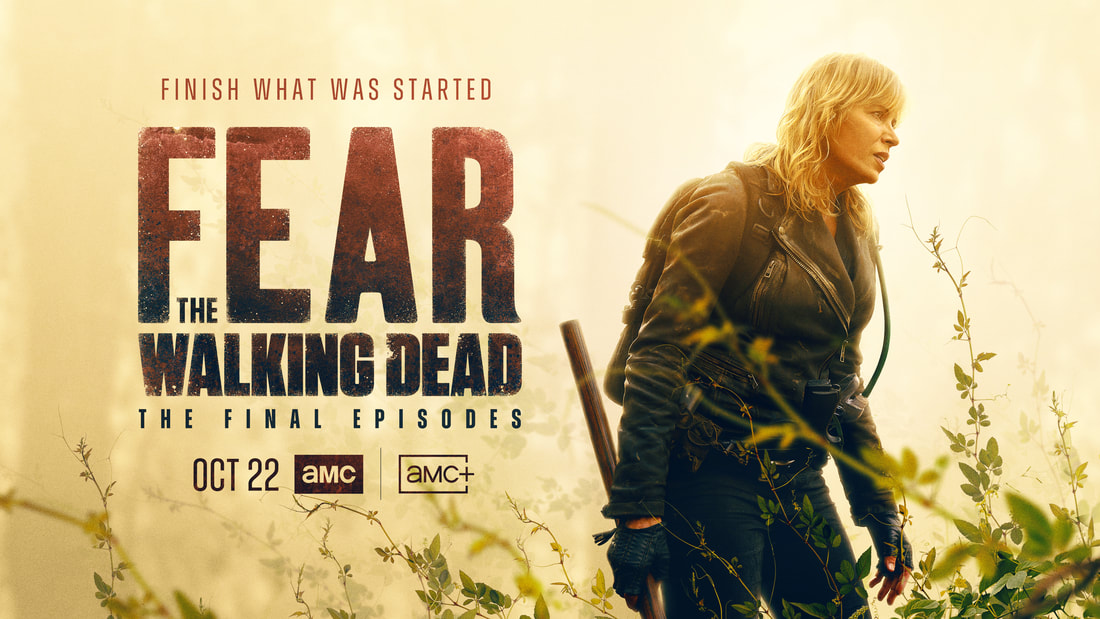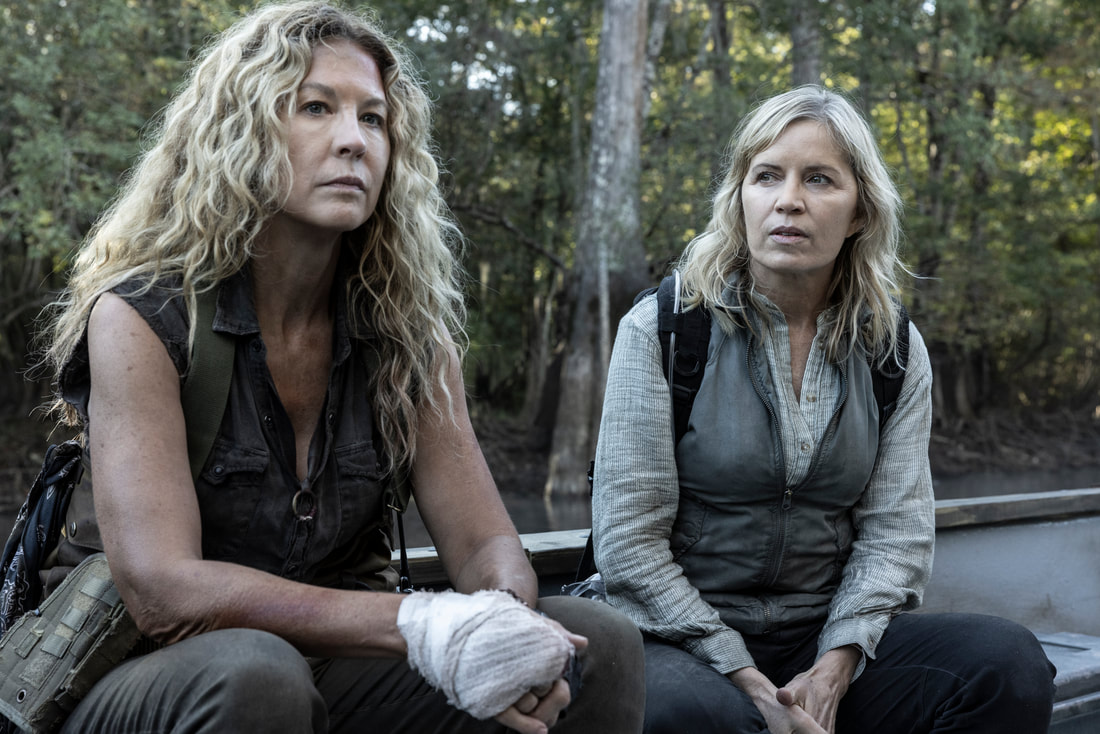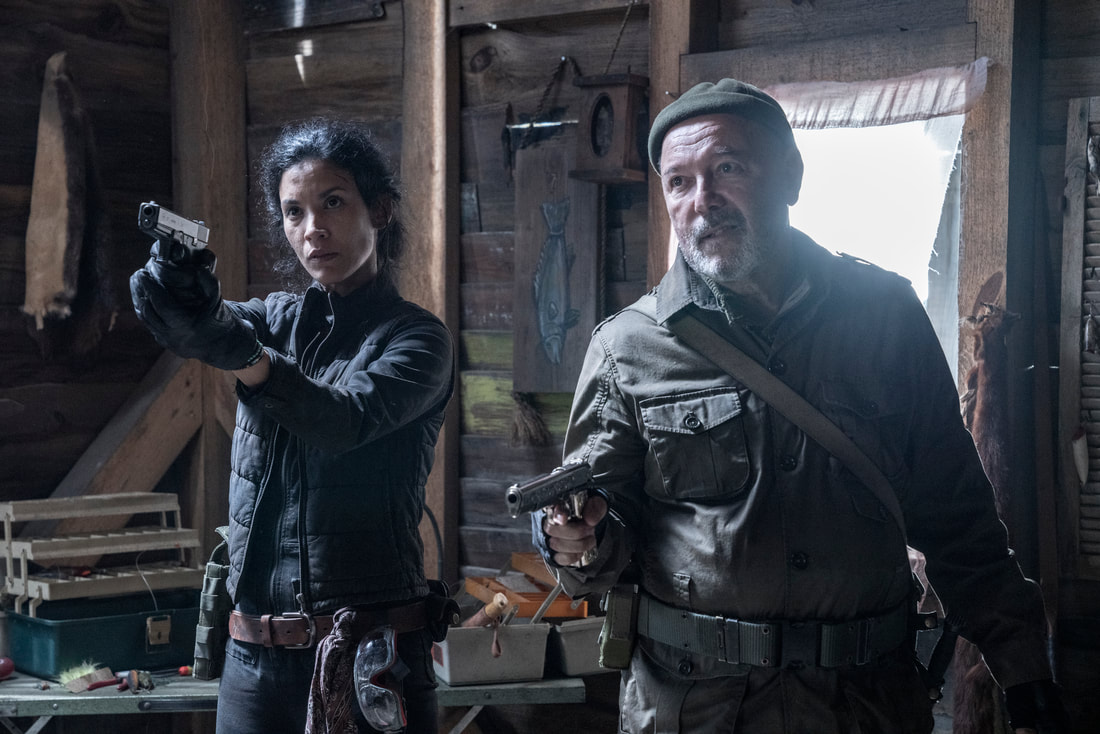 Key Art for ‘Fear the Walking Dead’ Courtesy of AMC. Key Art for ‘Fear the Walking Dead’ Courtesy of AMC. After eight wondrous years, and one-hundred and fourteen episodes, the hit AMC series, Fear the Walking Dead went off the airwaves last night. In a manner that was beautiful and satisfying, and now that this series has bid farewell, we thought it best to send it off in style with one last chat with some of the cast members of this amazing show. So, without further ado, here is what Kim Dickens (Madison Clark), Jenna Elfman (June Dorie), Danay Garcia (Luciana), and Rubén Blades (Daniel Salazar) had to say about the end of Fear the Walking Dead. Kim Dickens & Jenna Elfman John Betancourt: What do you feel the legacy of the show, message wise, is going to be now that the show has come to an end? Jenna Elfman: I just think the importance of family in whatever form, works for you. Um, but that it's so important that we are not alone in this world. And in any way, create a family a support system and enhancement tribe. It's just… and I think in the greater that human beings should all be that for each other in general. But to me, it's like, it started, the show started with family, and they connected with another family. And then they all started interchanging with their experiences and stuff. So that to me seems like the main theme is, family in any way. For the purpose of enhanced survival. Kim Dickens: I can't say it any better than that. I think what we walk away from, with the legacy of this ending is… I think it's about… how do you reconcile, you know, things in your past, with who you were when you began, who you are now, how you forgive yourself, how you forgive others. I think it's about resilience of the human spirit. And it is about coming together and following your better angels. And I think Jenna nailed it. It's family, whether it's chosen, or whether it's blood, you know, it's… that's what it's about. John Betancourt: I think it is safe to say, that fans take something away from the stories they love and that the same goes for the actors that play the characters in those stories. Ultimately, what did June and Madison teach each of you? Jenna Elfman: That, as a woman, bravery is frickin’ awesome. And that we are so strong, and that we are so much more capable than most people expect us to be, able to be, and, and how we sell ourselves short, sometimes on the subject of bravery as women. And it reignited a bravery in me. And I think that… I don't know that… I don't know, I think framing women as brave more often, I think is a good is a good idea. Because that's what we are. Kim Dickens: Yeah, I agree. Because, you know, what I took away from it was, “Wow, I could do that. I could do all that,” you know, and it did take courage. I'd never led a show before. I was never the lead on the show before, much less a genre piece that was an action piece, you know, but you know, it's okay, I just showed up every day. And I think that's what it reminded me to do, is just like… you just show up every day, doesn't matter, if you don't know how to do something, just show up and learn. And also, you know, we had to be so flexible as performers, because we really were asked on a daily basis or script by script, you know, to sort of sometimes have a different agenda than we'd had before, or a different emotional response than we'd had before, and make big changes. And so that sort of limber, being that limber and adapted, you have to be on your toes. And so, I walked away feeling like “Yes, I did it.” And I think Jenna is right, like the bravery, to frame women as sort of equals in that way, which I think we do on this show. We never sort of… I don't think any of the females ever felt like we were at any moment undervalued or not treated as an equal, we were just as strong as anybody else. So, you know, yeah, and we'll carry that. We'll all go and carry that into whatever other job, whatever other set we walk onto, those eight years or those four or five years, they’re in us. We’re changed now Danay Garcia & Rubén Blades John Betancourt: I will ask each of you what I asked your counterparts. As to what you think the legacy of the show will be now that it has come to an end?
Rubén Blades: That at the end of the day, what is going to keep the world going… is love. At the end of the day, what is going to keep the world going is empathy. At the end of the day, what is going to keep the world going is solidarity. And that's what I hope people end up understanding, the world is not going to survive, if each one of us digs, a hole and hides, we are not going to survive that way. We have to be together. So together we can face any possible problem and resolve it. That's what I hope people, even in the face of the most incredibly unbelievable circumstance, we can, as humans get together, bring love, and bring our will and we can save it and we can make it work. Danay Garcia: And for me, too, I always feel like, I always feel very proud that we are part of a show that talks about the living, not the dead, you know, talks about human connection, talks about survival, talks about, you know, friendship and hurt and pain and love and strength, you know, the dead are just gonna always be around us, it's the darkness that we have to maneuver, but always find that essence of who we are. And if we're lost, we can find each other, to discover it together. And, and that's always what kept us going on the show. That's what we always get, what’s so exciting you know, and that's why those relationships that were formed on screen and off screen are so meaningful. It’s because we really, we really worked in the cold, and the heat, in crazy places… but together. You know, but the crew, the cast, we were able to deliver, deliver our best and be there for the stories, and you have to have that solidarity with each other to be there. Because you know, we're in the apocalypse. But if we have that, we conquered, and we survived eight seasons together. And we're here and there's no you know, it's obvious that's really what the answer is… love. This interview has been lightly edited and condensed for clarity
0 Comments
Leave a Reply. |
Archives
April 2025
|
|
© 2012-2025, Nerds That Geek LLC.
All Rights Reserved. |
uWeb Hosting by FatCow



 RSS Feed
RSS Feed